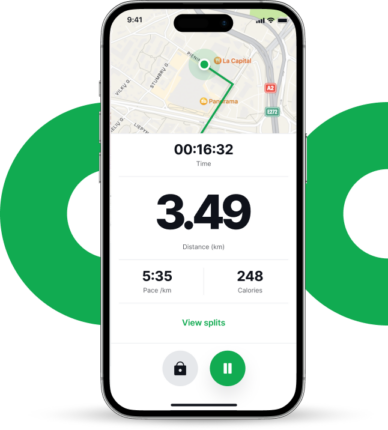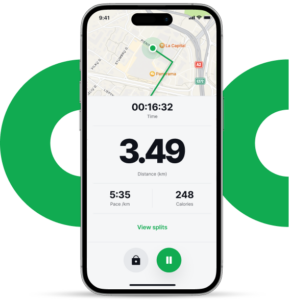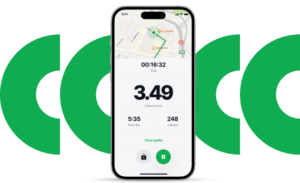Fasted running is an aerobic workout that promises to help you burn fat by reducing your body’s glucose energy stores. In the last few years, running on an empty stomach has gained popularity as a way to reach weight loss goals faster.
However, it’s important to understand the science behind running when fasting before deciding whether it’s for you. Fasted training isn’t the fat oxidation miracle that some claim it to be.
Read on to discover how fasted cardio works and explore the benefits and potential drawbacks of running fasted. We also explain running before breakfast.
In This Article
In This Article:
What Is Fasted Running?
Fasted running means going for a run on an empty stomach without having eaten for at least 4–6 hours.
When you run fasted, your body has little to no glycogen reserves and uses fat reserves for energy instead. This shift in the primary fuel source may help alter your body composition by reducing body fat.
Doing a fasted workout is easier in the morning since you wake up with an empty stomach. You can also engage in fasted exercise during the day.
However, your body will only be in an early fasting state rather than in a full fasting state. While this will reduce muscle glycogen, it won’t entirely deplete it.
Running when fasting and running on the intermittent fasting diet aren’t the same. The latter refers to running during the fasting window of the diet. With intermittent fasting, you may fast for 12–40 hours at a time, so you can run at any time during this period.
Often, the aim of fasting intermittently is for your body to enter ketosis to accelerate weight loss. It’s important to understand how intermittent fasting works before trying it out, as it requires a longer commitment than fasted running.
Does fasted running burn fat?

A 2016 article in the British Journal of Nutrition suggests that running when fasting can burn more calories than running on a full stomach. This occurs as a result of increased fat oxidation, the process by which the body breaks down fat into energy.
The intensity of the exercise matters. Research shows that lower-intensity exercise burns more fat for energy than high-intensity exercise.
However, another study has challenged this. Its authors recommended against high-intensity efforts on an empty stomach.
Other research also notes that running “empty” can increase levels of the stress hormone cortisol. When cortisol is chronically high, it can change fat metabolism, and fat storage may increase.
Is it better to go running on an empty stomach?
Running “empty” may be convenient and feel good for some runners. If you don’t train intensely, fasted running can be an option, provided you follow the right running workouts.
On the other hand, fasted running also has drawbacks that can impact your running performance and promote poor metabolism. It’s not recommended if you suffer from relative energy deficiency (RED-S), disordered eating, or other health conditions.
Before abstaining from food, weigh the benefits of fasted running against the potential drawbacks.
Benefits of Fasted Running – Is it Good to Do a Fasted Run?

From a lower energy intake and accelerated weight loss to developing mental toughness, here are the benefits of fasted running.
Lower energy intake
According to a study, fasted running could lower energy intake over the day. The body stores energy in the form of glycogen in the blood, muscles, and liver.
Running on an empty stomach makes your body tap into liver glycogen stores. In the study, fasted training made participants eat less.
May burn body fat
As we’ve seen, some research suggests that running when fasting may accelerate fat burning. According to this strand of research, if you want to run for weight loss, fasted running may help.
However, the fat burning potential of running when fasting has been challenged in recent years. It’s unrealistic to expect fasted running alone to lead to massive weight loss. Diet, rest, and following effective running workouts all matter.
May enhance endurance
A small study involving 14 participants associated fasted exercise with a higher maximum oxygen uptake during intense exercise.
This suggests that running fasted may improve aerobic capacity and performance. However, more research is needed to confirm this and explain how this happens.
Saves you time
One of the most persuasive reasons to try running has nothing to do with science and all to do with convenience. Quite simply, you don’t have to worry about pre-run meals.
Often, you may feel uncomfortable running on a full stomach. That means that even if you eat before a run, you have to wait at least 30–60 minutes before you can run. With fasted running, you don’t have to worry about that.
Toughens you mentally
Going for a moderate to intense run on an empty stomach isn’t easy. With no energy intake source on hand, you may have to work harder to reach your desired pace and keep going.
That can help you develop mental toughness, discipline, and willpower. These skills are useful for runners that participate in endurance events.
Downsides of Fasted Running – Is Running on an Empty Stomach Safe?

Before you commit to fasted training, it’s important to understand the risks. From hypoglycemia and low energy availability to the breakdown of muscle and poor performance, the risks are real.
Increased risk of low blood sugar
Fasted running may cause low blood sugar levels or exercise-induced hypoglycemia. This condition may cause weakness, shakiness, dizziness, and fainting. Runners with type 1 or type 2 diabetes are especially at risk.
Glucose is the body’s main energy source. When you run “empty,” your body uses more blood glucose. This demand for glucose may trigger hypoglycemia.
Decreased energy levels
Running without eating beforehand could lead to low energy availability. This occurs when your body may not have had time to replenish glycogen stores through food.
Average glycogen stores last between 12 and 14 hours. But you may enter a glycogen-depleted state in as little as 2 hours of moderate-intensity activity.
Potential muscle breakdown
After burning glycogen reserves, your body relies on fat stores. Put another way, fasted training can trigger fat burning for energy. However, skipping meals and having a lean body could lead to low fat stores.
Your body then may start burning amino acids, the molecules that make proteins. Since your body doesn’t store amino acids, the only way for it to access these is to burn muscle mass.
Reduced performance
Running fasted may affect your carbohydrate metabolism. The longer and more intense your run, the higher your dependence on carbs. Nevertheless, you can still add variety to your morning workout routine with fartlek runs.
Fasted training can deplete your glycogen stores and make it harder for your body to recover. The speed and the intensity of your run may suffer.
It’s unrealistic to expect the best performance from your fasted runs. Or to push yourself too hard.
How to Do a Fasted Run
Around 4 hours after eating, your blood glucose and insulin levels begin to decline. Your body starts to convert glycogen into glucose to use as energy. As liver glycogen stores run out, your body taps into triglycerides from fat cells and amino acids.
An early fasted state could help you burn through available glycogen. But you need a night’s sleep to enter the fasted state when your body starts burning fat for energy.
Run in the morning on an empty stomach. If that’s not possible, wait at least 4 hours after your last meal before you go on a run.
Remember to do slower runs since your body won’t be geared for high effort. And as we’ve seen, some research suggests low-intensity running may help you burn more fat.
Staying hydrated during your fasted run is crucial. Water has no calories and won’t break your fast. But energy drinks and other snacks for runners have calories and may interfere with the benefits of fasted running.
Nutrition Tips for Fasted Running
Getting fasted training right becomes easier if you plan your meals, hydration, and post-race refueling. For example, eating carbohydrates is important the night before a fasted run.
- Eat a high-carb, low-fat meal the night before a fasted morning run. Carbs will create a glycogen store that prepares your body for your run. Bear in mind that some types of diets, like the fat-protein efficient diet, may not be ideal for this.
- Focus on whole grains. Whole-grain pasta or rice, quinoa, or buckwheat with lean protein are key components of a healthy diet for runners.
- Drink enough water before a run to feel hydrated. Don’t just drink water for the sake of it – stop when your body tells you to.
- Don’t eat any pre-run snacks before a fasted run. Zero-calorie snacks are a myth – there are only low-calorie snacks, and these break a fast.
- Bring a water bottle with you on your run. If you’re going for a long run or taking part in endurance events, a water bottle will help you stay hydrated. Refrain from eating anything during your run, as this will replenish glycogen.
- Drink enough water after your run. Alternatively, you can have a recovery drink.
- Eat protein and healthy carbs within 2 hours after your run to help your body recover. Try yogurt with granola, oatmeal with fruit, peanut butter on whole-grain bread, or a protein-rich fruit smoothie.
We dedicated a whole post to what to eat before and after a run – check it out.
FAQ
Can beginners try fasted running?
Yes, but you need to accept the risks and don’t push yourself too hard. Start with an easy morning run, make sure to stay hydrated, and refuel properly after your run.
Should I run fasted or fed?
It depends on your fitness level and goals. Running fasted may help you lose more weight, eat less after, and become a mentally tougher runner. Risks include hypoglycemia, poorer performance, and muscle breakdown.
Is running fasted cardio?
Yes, running fasted is a form of medium-intensity cardio exercise that can help you burn calories.
Takeaways
Running on an empty stomach may help burn fat faster and change your body composition. Other potential benefits of exercise in a fasted state include lower appetite and better endurance.
However, it’s not without risks, such as low energy, low blood glucose levels, and potential muscle mass loss.
You can try fasted running as a beginner. But it’s important to eat well the night before, stay hydrated, and don’t push yourself too hard. Avoid hard workouts.
With Joggo, beginning your running journey becomes easier – whether you run when fasting or not.
Joggo provides personalized running plans and meal plans according to your goals. It’s also a go-to resource for smart tips and tricks and science-based educational articles on the running.
Begin your running journey today with Joggo.
References:
- Blackburn, G., Hay, J., Skagen, C., Paul, E., Achcar, F., Wilson, J., Best, C., Manson, E., Burgess, K., Barrett, M.P. and Gill, J.M., 2020. Running on empty: a metabolomics approach to investigating changing energy metabolism during fasted exercise and rest. Metabolites, 10(10), p.399.
- Nieman, D.C., Carlson, K.A., Brandstater, M.E., Naegele, R.T. and Blankenship, J.W., 1987. Running endurance in 27-h-fasted humans. Journal of Applied Physiology, 63(6), pp.2502-2509.
- Aziz, A.R., Wahid, M.F., Png, W. and Jesuvadian, C.V., 2010. Effects of Ramadan fasting on 60 min of endurance running performance in moderately trained men. British journal of sports medicine, 44(7), pp.516-521.
- Deighton, K., Zahra, J.C. and Stensel, D.J., 2012. Appetite, energy intake and resting metabolic responses to 60 min treadmill running performed in a fasted versus a postprandial state. Appetite, 58(3), pp.946-954.
- Jamart, C., Naslain, D., Gilson, H. and Francaux, M., 2013. Higher activation of autophagy in skeletal muscle of mice during endurance exercise in the fasted state. American Journal of Physiology-Endocrinology and Metabolism, 305(8), pp.E964-E974.














